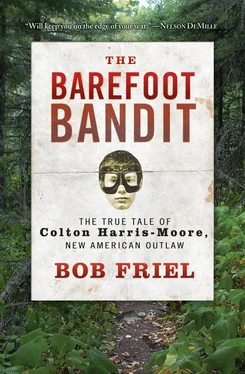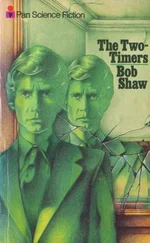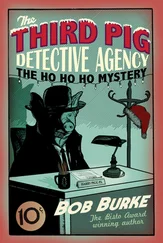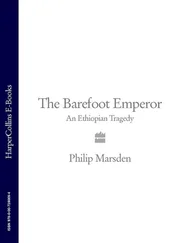There are a couple old-school English-style courts in Nassau, impressive buildings, and I’d expected Colt to appear in one of them. Instead, we were led upstairs into a tiny, dimly lit workaday courtroom used for minor cases. It was hard to tell what this meant until a woman, one of about eight Bahamians in the small gallery, leaned over and whispered to me that she recognized the man sitting at the prosecution table as an immigration officer. Aha. Colt definitely wasn’t going to Fox Hill.
Suddenly we heard a muffled commotion outside. The crowd began yelling and cheering as Colt—in chains and surrounded by a cordon of cops—was baby-stepped down the street. He bent low at the waist to avoid the eyes of all the cameras, but some bystanders mistook it for shame and a few began shouting encouragement: “Hold ya’ head up, boy!” “You a hero, dog!” “Tell it to the world!”
Finally, he was led into the courtroom. In deference to the formality of the court, Colt wasn’t barefoot. Not that he wore dress shoes—they’d given him a pair of bobo-white sneakers but had confiscated the laces. The huge tongues flopped out absurdly. Colt had on a bulletproof vest over a white T-shirt and black baggies. With no cameras allowed in the courtroom, he walked upright, though he kept his eyes down as an officer escorted him to the defendant’s dock about ten feet from where I sat.
After staring at Colt’s goofy self-portrait for the last ten months trying to decipher what was behind that strange expression, I was a little surprised that he was actually a good-looking kid. Even after the circus outside under the hot sun, he also appeared remarkably calm and cool.
All rose as Chief Magistrate Roger Gomez entered and took his place on the bench below a small Bahamian coat of arms, with its conch shell, blazing sun, leaping marlin, and pink flamingo.
Gomez, a large man with a bright streak of gray like a paint splash in his black hair, began speaking very softly. Everyone in the gallery leaned forward, straining to catch the words.
“Colton Harris-Moore, please stand.” Colt stood up straight, taller than anyone else in the room. He looked directly at the judge.
“Colton Harris-Moore, you are charged contrary to section 19-1 and 2 of the immigration act… You were found in Harbor Island, Eleuthera, in the Commonwealth of the Bahamas, having landed from a destination outside of the Bahamas without legally going through immigration. Do you understand the charge?”
“Yes, Judge,” Colt replied in a deep voice.
“How do you plead to the charge—”
Before the judge could finish his sentence, Colt jumped in and said, “Guilty.”
The judge calmly finished, “… guilty or not guilty?”
“Guilty,” Colt repeated.
The immigration officer testified that he’d checked the files and there was no official record of Colton Harris-Moore arriving in the Bahamas and presenting his passport.
Colt’s attorney was Monique Gomez, the judge’s niece, who’d been retained by the same person back in Washington State who offered Colt $50,000 to turn himself in when he began his summer road trip. Colton, she told the judge, admitted that he “swam to the Bahamas” sometime in June, but neglected to bring along a passport. She said that he wished to save the court the trouble of a trial and thus was pleading guilty.
The judge shuffled some papers and seemed a bit reticent to speak. Finally Colt was asked to stand again. He stood and looked down at his marshmallow-like shoes and shuffled his feet awkwardly.
“Colton Harris-Moore,” began Chief Magistrate Gomez, “having pleaded guilty to the charge of illegal landing, and in consideration of you saving the court’s time by pleading guilty to the charge, we impose a fine of three hundred dollars or three months in prison… and immediate deportation is recommended.”
The clerk immediately said, “All rise,” and the judge bolted out a side door.
THAT WAS IT. COURT dismissed. Everyone began to shuffle past, but I stayed put, watching the side of Colt’s face, hoping for a look at his eyes to get a read of what he was thinking and feeling. He hadn’t turned toward the gallery throughout the entire proceedings. A detective walked up and reached for Colt’s hands to redo his cuffs. At that point, Colt took a quick sideways glance around the room. I was staring intently, looking for fear, relief, sadness, despair… The last thing I expected to see was recognition. Colt looked at me and suddenly broke into a huge smile.
I involuntarily broke into one of my own.
I DIDN’T KNOW WHAT Colt saw other than an unexpected familiar face. Later I’d wonder if he recognized me just from photos on the Internet or if he’d gotten close enough to see me back home in the Northwest. At this moment in the courtroom, though, all I saw was a big, genuine smile from a kid in bad circumstances.
Colt looked down as the detective pulled his arms around and re-cuffed one of his wrists. Then Colt looked up at me again, smiling and giving a nod that seemed to acknowledge, maybe appreciate, that I’d come this far.
Colt glanced down again, then looked back with one more grin, this one accompanied by a sly little head shake that unmistakably said, “What a ride, eh?”
* * *
That third smile was noticed by the detective clamping on Colt’s cuffs. He glared at me, then barked at Colt, asking twice, “Him man your friend?” I couldn’t hear what Colt answered, but I started out the door before I found myself with my own immigration problem. A TV producer in the room had also noticed, and when it was reported, some folks put that together with the coincidence of my Bahamas background and blog posts in order to speculate that I’d been doing some travel consulting for Colt. Obviously not true.
I tried to linger in the courthouse hallway to get close enough to talk to Colt, but the larger of the two ninjas persuaded me to move along. I did manage to hold against the tide near the outside door, though, and asked Colt if he was okay. He’d already gone into his anti-paparazzi bow, but lifted his face and said, “Yeah.” A few steps past me, he entered the gauntlet, with reporters shouting questions, including repeatedly asking if he had any messages for his mother. Colt told them to “go to hell.”
The RBPF then marched Colt on what must be a world-record perp walk from the court building, through a shopping center, then up the street to a police station. The American authorities announced again that it might take a long time to get Colt back to the States. But as expected, he was in Miami later that afternoon.
The Bahamian government had played it smart. Their police force received well-deserved praise and worldwide recognition for capturing Colt without anyone getting hurt. The decision to not charge him caused some political blowback, however, with the leader of the opposition calling it “a national disgrace,” and some editorial commenters saying it proved there was a double standard, that a Bahamian citizen could not have fired a shot from a stolen boat and received only a small fine. A fine that, by the way, was also paid for by the mysterious Washington benefactor who’d offered the $50,000.
PART 6
GAME OVER

Colt’s next flight was aboard the U.S. Marshall’s Con Air . The Feds transported him back to Washington State and placed him in solitary confinement at the SeaTac Federal Detention Center. After waiving his Sixth Amendment right to a speedy trial, Colt’s attorneys John Henry Browne and Emma Scanlon began an attempt to herd cats in the form of a dozen prosecutors representing a multitude of victims and politically beholden to the affected communities. Browne’s strategy was to create a “global” plea deal for Colt that wrapped all the federal and state charges into one package.
Читать дальше













